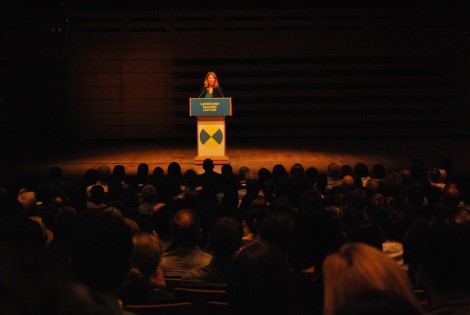Activist, author, and journalist Naomi Klein was chosen as the speaker of this year’s fourteenth LaFontaine-Baldwin Lecture that took place last Monday at Koerner Hall.
The lecture entitled “The Leap Years: Canada Beyond Extractivism” was part of 6 Degrees, a three-day forum spearheaded by the Institute for Canadian Citizenship (ICC). During the event, leaders came together to discuss problems relating to citizenship and inclusivity and to propose possible solutions to these complex problems.
Klein’s work has primarily focused on economics and writing books, such as No Logo: Taking Aim at the Brand Bullies and The Shock Doctrine: The Rise of Disaster Capitalism, where she criticized corporate capitalism and neoliberalism.
More recently, Klein has turned her attention to the dangers of climate change. Her latest book, This Changes Everything: Capitalism vs. the Climate, was a New York Times bestseller and has garnered significant attention world-wide as a reality check on the relationship between climate change and capitalism.
Klein is also heavily involved in Canadian politics. She helped to create a policy proposal aimed at combating climate change, called the Leap Manifesto.
A former U of T student, Klein once served as The Varsity’s Editor-in-Chief. She dropped out of U of T after her third year to pursue a position at The Globe and Mail.
An Indigenous powwow drum group called the Smoke Trail Singers performed at the event. They performed a piece called “An Honour Song for Mother Earth’s gift of the waters which provide for us all,” and then delivered a statement of land recognition to the territory of Mississaugas of the New Credit First Nations.
Canadian philosopher John Ralston Saul introduced Klein to the stage and conducted an interview with her after the lecture.
The lecture ended with the Nai Syrian Children’s choir singing “Singing for Peace” in Arabic, English, and French. The choir consisted of Syrian children ages six to 12, who are all recently-arrived refugees to Canada.
Klein on Canadian stories
While introducing Klein and her vast body of work, Saul recounted a history of Canada, putting particular emphasis on Louis-Hippolyte LaFontaine and Robert Baldwin, the 1848–1851 leaders of The Great Ministry, “a government built on diversity, inclusion, non-violence and a powerful commitment to the public good.”
Klein also spoke about Canada and the many different stories that make up this country. She began with her own Canadian story and her “dirty Canadian secret” as she calls it: “I’m actually American.”
Klein went on to explain her story of holding joint citizenship with the US and Canada, as her parents were born in the US.
More critically, Klein addressed some of Canada’s darker stories: “It can be painful to look too closely at the stories that make us feel good,” she said.
Klein spoke of Canada’s involvement in wars, as well as institutionalized racism in the immigration system where migrants can be “thrown in jail for years, charged with absolutely no crime.”
“Three migrants have died in detention in Canadian jails, just since March,” Klein continued.
Canadian stories, values, and identity are not fixed concepts, she argued.
Instead, Klein explained, they are bound to change and sometimes this is not without struggles, “which is why regular people, not just governments, need to be active participants in this process of re-telling and re-imagining our collective story.”
Making the leap
Klein spoke extensively about the Leap Manifesto and the research and consultation process involved in its creation.
The Leap Manifesto is a list of calls-to-action that Klein co-wrote, which became the subject of debate at April’s New Democratic Party convention. The manifesto calls for the complete removal of non-renewable energy sources in Canada with an approach that recognizes Indigenous communities as the “original caretakers of this land.”
The document also calls for rapid and radical change to the structure of Canada’s economy, instead of a gradual approach to weening off non-renewable resources.
It has received significant amounts of feedback from all parts of the political spectrum. Some politicians were particularly, upset by the manifesto. For example, Alberta Premier Rachel Notley called the manifesto “naïve” and “tone deaf.”
Despite the apparent backlash, the Leap Manifesto has garnered 42,451 signatories, including Neil Young, Ellen Page, and Alanis Morissette. It has also been endorsed by various organizations and some businesses, including the Toronto chapter of Black Lives Matter, Idle No More, and LUSH Fresh Handmade Cosmetics.
Klein stressed the importance of “climate justice” and how issues of climate change intersect with other issues: “This is a global movement that is about finding integrated solutions, policy that will radically impact climate science, while simultaneously fight inequality on every front — particularly racial injustice.”
Klein commented that, when planning for the Leap Manifesto, the authors ensured that nostalgia would not be a theme because the past “never represented Indigenous sovereignty” and “excluded many communities of colour” from the conversation.
Canada, Klein argued, is a moderate nation that is adverse to extreme change; this is why Klein doesn’t deny the fact that the Leap Manifesto is a radical document.
Klein argues that the absence of a “leap” in Canada’s policies and practices will inevitably lead to a radical place because: “If we stay on the road we’re on and we don’t do much of anything, it takes us to a very radical place: 4-6 degrees of warming.”
“This is why I sometimes say the future is radical, we just have to choose which kind of radical we want,” Klein continued.
Former Governor General of Canada Adrienne Clarkson concluded the event by discussing the ICC and 6 Degrees: “You know, John Ralston Saul and I co-founded the ICC a little over 10 years ago after leaving Rideau Hall; we dreamed of having something that we have now — like 6 Degrees.” She described the importance of welcoming newcomers and assisting them in their transition to Canadian life.



